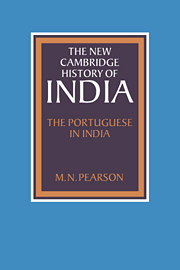7 - Towards reintegration
Published online by Cambridge University Press: 28 March 2008
Summary
Many of the themes of previous chapters will be found writ large in a sketch of the history of Portuguese India from the mid seventeenth century. After the loss of the large and prosperous area of Bassein in 1739, the Portuguese ruled only Goa, Daman and Diu. The latter increased in size in the 1760s and 1770s when the relatively infertile and sparsely populated seven New Conquest talukas were added.
If the Portuguese at their height in the sixteenth century had a rather patchy impact on Indian life, how much more did this apply to such a minuscule ‘empire’. The official Portuguese presence was, frankly, opéra bouffe, strong still on titles and pomp and circumstance, but of no significance in wider Indian affairs. At a lower, or unofficial level, one finds the continuance of powerful religious influence, already touched on in chapter 6, and a continuing role for some Indo-Portuguese traders, usually ethnically Indian. If one can see in the sixteenth and early seventeenth centuries the church and private traders playing important roles under the imperial umbrella, then what happened later was that as the umbrella folded the role of these two groups became more discernible. Their actual functions probably remained rather constant throughout, but this has often been obscured for historians by the dazzle of the imperial canopy, especially in the sixteenth century.
Much of what follows will be tentative indeed. The eighteenth and nineteenth centuries have been neglected by historians. It has been felt that with the decline of empire nothing of interest can be written about the Portuguese in India.
- Type
- Chapter
- Information
- The Portuguese in India , pp. 144 - 162Publisher: Cambridge University PressPrint publication year: 1988

